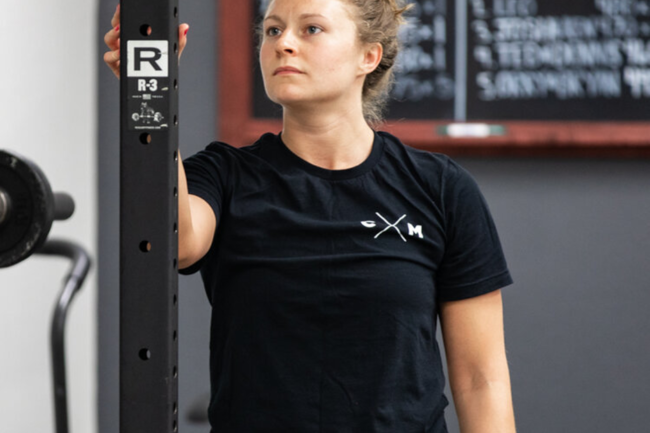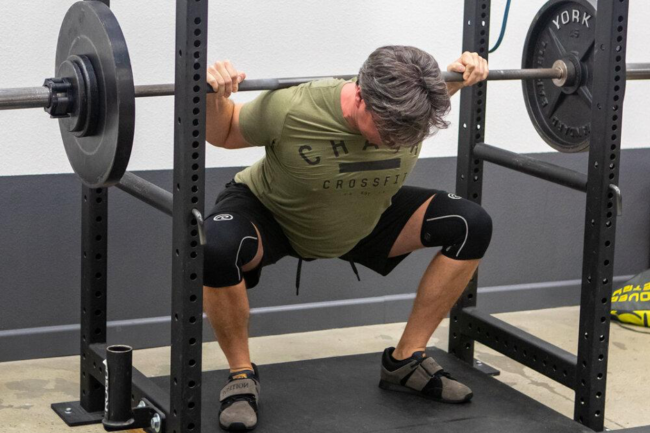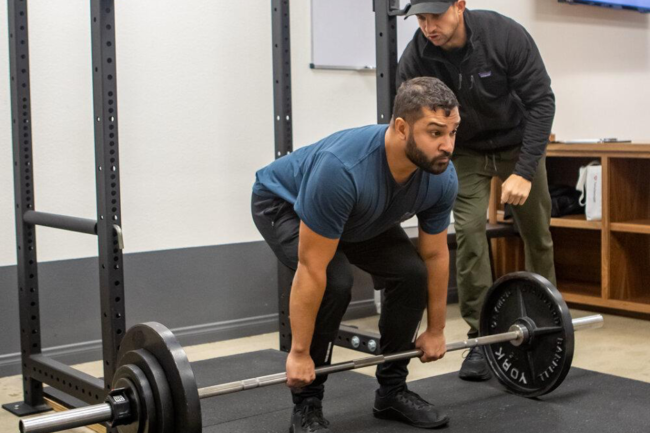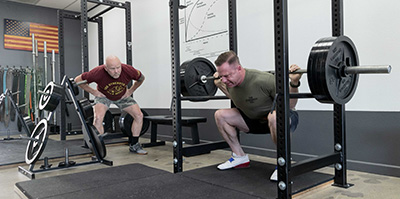When Progress Slows
By: Mike Minigell, SSC
The Strength Co.
You decided that you wanted to get strong. You got a barbell, some weights, and all the equipment needed to perform the big barbell lifts. You began training the squat, press, bench press and deadlift, adding a little weight each session — and then, one day it didn’t work.
You went to perform your three sets of five and you only got four reps on one of the sets. Now what? Am I stuck? Is it over? Do I have bad genetics? Should I start a new program? These are actually not the questions you need to ask.
You should begin by asking these:
How long did I rest between each set?
Strength training is different from going into the gym for a “workout”. There’s a goal in mind. It’s measured. You know exactly what you are supposed to do when you walk up to the barbell.

Rest between sets is an important variable for the lifter. The goal is to get stronger — to put more weight on the bar, so rest needs to be adequate in order for you to complete all three of your sets. The window we like is two to six minutes; two for the newer lifter that is still learning the technique, and up to six for the lifter that is really dealing with some heavy loads. An extra minute can make a world of difference.
Am I recovering?
Recovery happens from sleep, nutritional intake, and not applying other stressors.
Sleep. This is your best friend for recovery, and it’s one of the harder things to get enough of. If you really want to get stronger, establishing a routine will help you be compliant and get more rest. You will feel it in the weight room!
Nutrition. What you eat is vital for facilitating recovery. How much protein am I getting? Am I getting enough calories to allow for recovery? Am I eating consistently? We’re not telling you to pig out, but you do need to make sure you are at a minimum hitting your protein goals (1g/lbs) every day.
Rest. What we mean by this is not doing other stressful things. Being active and moving around is good for recovery. But if you’re blasting your arms with dumbbells on your “off days” don’t expect your heavy presses to not punish you for it. Walking, light hiking, bike rides etc are all good ways to stay active while not causing too much stress.
Am I being patient?
Greed is a common mistake that many lifters make (myself included). Comparing your deadlift to someone else’s and trying to rush to get there generally never pays off. Be patient. Adding weight too quickly to the lifts is a fast track to missing a rep prematurely.

Ten pound jumps on the squat and the deadlift work for the first few training sessions. But they will need to be taken down to five within just a few weeks. Same is true for the bench press and the overhead press; five pounds for the first few sessions and then down to one to three pound jumps.
If you find that you have been taking proper considerations for the three scenarios above, it may now be time to make some adjustments to your programming to continue to drive progress.
Should I try back off sets?
When you start missing reps on the bench press and press even when making small increases in weights (one to three pounds), it’s time to make some adjustments.
The Press. The press is the most common lift to experience a missed rep with for a newer lifter. Assuming form is dialed in, we like to use back-off sets to keep progress going. An example of this:
Go up in weight one to two pounds from your last workout and aim for 5 reps as you normally would. If you get 5 great, keep going. If you only get 3-4 reps don’t stress it. Take about 5 to 10 % off of the bar so that you can get 5 reps but it’s still very difficult. We call these back off sets – it is a good approach to a stalling upper body lift.
The “top” set will still go up session to session and the back off sets will ensure you still get enough volume. This is not a forever program, but it might buy you a few more weeks of progress on the bar. It’s just a tool for your tool box.
Have I added any light days?
The squat drives the most adaptation for a new lifter on linear progression. And most of the time it will last the longest of all the lifts in terms of the ability to keep adding five pounds. But eventually it will stall.

Assuming you’ve learned how to work hard on a squat, it’s now probably time for a “light day”. Instead of going up in weight every workout (three times per week), now go up only two times per week with an 80% session on the middle training day.
The “light day” will surprise you by how hard it is, but it will give you enough of a break to make progress on the other two “heavy” sessions. Just another option to allow you to keep lifting and not give up.
How long are my recovery periods?
The deadlift is typically the heaviest of all the lifts during linear progression, so it must be programmed accordingly to ensure it’s not overtrained. It recruits YUGE amounts of muscle mass and weight is added very quickly over the first few weeks.

Before the deadlift “fails” we like to eliminate one of the deadlift training sessions for the lifter. By substituting chin-ups, power cleans, or barbell rows it allows the deadlift to “recover” longer between deadlift sessions so that you can still add more weight to the bar.
As the deadlift continues to get heavier, (closing in on two times bodyweight) it will need even more time for recovery. When this happens we will cut it down to one session per week. This will last a long time and allows you to keep adding weight to the bar for sets of five without failing.
It Will Get Difficult
At the end of your first few months of lifting weights, it may actually be the most difficult that it will ever be. You will have been adding weight to the bar each session in some variety for months. The volume, intensity, and tonnage has all been very high. You are fatigued and battling for a few more pounds on the bar every single session, wondering if you will be able to do it.
When you start to miss, do not be stubborn and continue to miss the same weight over and over. Make a minor change. Do not wuss out either, you have to show up and attempt the weight even when you don’t want to.
Will these changes work for me? It depends. The stronger you become the harder it is to get even stronger. The law of diminishing returns.
These are just a few simple tools to keep frustration at bay and weight going up on the bar. Hopefully you have access to a coach, in person or online that can help you make these decisions so you can focus on what’s really important. Lifting.

